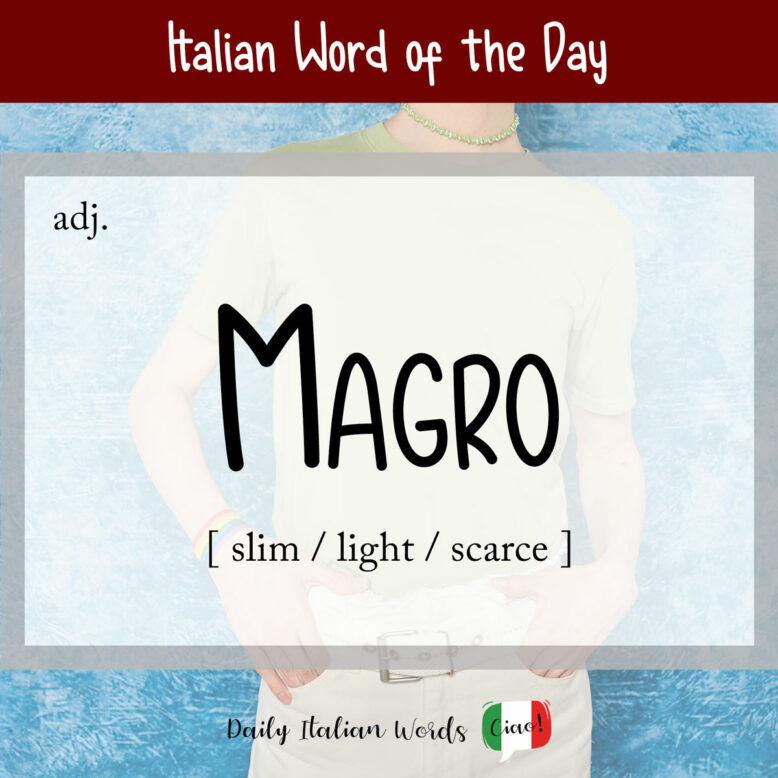Some adjectives in Italian have only one straightforward meaning, while others encompass a range broader than you might anticipate. Magro is one such adjective!
magro
thin / light / scarce

Since magro is an adjective, its ending changes based on the gender and number of the subject – magro (masculine, singular), magra (feminine, singular), magri (masculine, plural) and magre (feminine, plural). It comes from the Latin macrum.
Magro = thin, slim, slender
Let’s begin with the most commonly understood meaning of magro, which is thin, slim, or slender, used to describe a person’s overall physical appearance or the appearance of their individual limbs.
Penso che Marco sia troppo magro.
I think Marco is too thin.
While primarily used as adjectives, magro and magra can also function as nouns, denoting a slim man and a slim woman, respectively. A falso magro (“fake slim”) refers to someone who appears slim but is not actually so. Interestingly, it’s also the name of a popular Sicilian dish!
A synonym for magro is snello. Whereas magro is almost always used in a neutral or negative sense to mean (too) thin, snello is a complimentary term. If you call a person snello, you are implying that they have a slender build and a healthy, attractive physical appearance.

Here are some idiomatic expressions that use magro in this sense of the word:
- magro come un’acciuga = as skinny as an anchovy
- magro come un chiodo = as skinny as a nail
Magro = light, low-fat, lean
Magro can also be used to describe foods that are low in fat. For example, low-fat yogurt is known as yogurt magro while low-fat milk would be translated as latte magro.
Interestingly, magro is also a masculine noun that means lean meat, though you can also say carne magra.
Devo comprare un chilo di magro per la ricetta.
I have to buy a kilo of lean meat for the recipe.

Magro = scarce, poor, meagre, slight
Figuratively speaking, magro can mean scarce, poor or meagre, typically in reference to a person’s profit or salary, or a result or outcome.
Come faccio a vivere con uno stipendio così magro?
How can I live on such a meager salary?

However, it can also describe other impoverished circumstances, such as a lean year (un’annata magra), a scant harvest (un raccolto magro), or a meagre satisfaction (una magra soddisfazione).
Fare una magra figura means to make a bad impression, to make a gaffe.
The expression tempo di vacche magre (lit. time of slim cows) means “a time of extreme poverty”.
Magro = abstinence from meat
Before we bring this article to a close, it’s worth mentioning how magro is also used to mean abstinence from meat in religious contexts.
For example, giorno di magro means day of abstinence from meat, while pranzo di magro means meatless meal. The expression mangiare di magro means to not eat meat.
Oggi mangiamo di magro.
Today we’re not eating meat.
Giorno di magro can also be used in a figurative way to describe a negative, poor result, resulting in a bad day. (Un giorno di magro per la squadra = a bad day for the team).
Heather Broster is a graduate with honours in linguistics from the University of Western Ontario. She is an aspiring polyglot, proficient in English and Italian, as well as Japanese, Welsh, and French to varying degrees of fluency. Originally from Toronto, Heather has resided in various countries, notably Italy for a period of six years. Her primary focus lies in the fields of language acquisition, education, and bilingual instruction.


